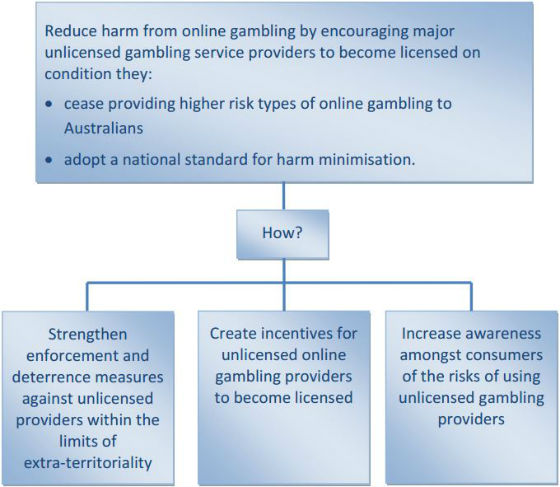Recommendations for Australian Interactive Gambling

Yesterday, Australia’s Department of Broadband, Communications and the Digital Economy (“DBCDE”) released it’s much anticipated final report on its review of the Interactive Gambling Act 2001.
Australia’s Interactive Gambling Act 2001 (“IGA”) was one of the first laws passed worldwide to deal specifically with Internet gambling regulation. Like most first models, it hasn’t exactly set the world on fire, a point clearly made in the first the lines of the DBCDE report:
“The primary objective of the IGA is to reduce harm to problem gamblers and to those at risk of becoming problem gamblers. The evidence since the last review of the IGA suggests that it is making only a very minor contribution to this objective”
The IGA’s overriding problem is that it is heavy on prohibitions (pretty much all forms of online gambling except non in-play sports bets) but very light on effective enforcement of those prohibitions. As a result you have a situation where:
- unlicensed (overseas) operators are relatively free to offer casino games, poker and in-play sports wagers to Australians and passively market such services online;
- Australian gamblers are spending an estimated $1 billion annually with these operators; and
- locally licensed (sports betting only) operators complain that they can’t offer customers the same in-play bets that their overseas competitors are offering.
The DBCDE report came up with 32 recommendations to address current IGA shortcomings. Broadly, those recommendations are designed to on the one hand loosen certain prohibitions thereby giving some incentive to currently unlicensed operators to join the party and get a license, while on the other hand introducing tougher measures against non-compliance.
Diagram 1 from the report

Strengthen enforcement measures
Until such time as they decide to apply for or acquire a local sportsbetting license most large EU based gambling organizations seem to have scant regard for the provisions of the IGA. Why would they…it’s simply not enforced. It’s no surprise that the list of live casinos open to Australians includes some of the biggest names in the online gambling industry.
Interestingly, Betvictor comes in for particular attention (pages 43 & 127) as an example of an unlicensed overseas operator providing both in-play bets aimed at Australian punters (local sporting events) as well as casino games (no mention of live dealers).
While recognising the practical limits of enforcement action against overseas operators (lack of jurisdiction, complexity and cost of transaction and site blocking etc) the report lists a number of recommendations aimed at better enforcing the IGA generally. They include:
Recommendation 4: The IGA be amended to make directors, principals or other persons acting in an official capacity for a provider liable of an offence where there is refusal to cease offering services in contravention of the IGA.
Recommendation 5: The Australian Communications and Media Authority (the ACMA) be appointed the watchdog with powers to:
- issue civil (including pecuniary) penalties by way of an infringement notice;
- issue take-down notices to internet gambling service providers in relation to prohibited internet gambling content hosted in Australia; and
- apply to the Federal Court for injunctive relief if an Australian-hosted internet gambling service provider ignores take-down notices.
Recommendation 6: ACMA publish a list of known prohibited internet gambling providers on its website
Recommendation 8: The IGA be amended to provide a safe harbour for financial institutions so they can voluntarily block financial transactions between Australian consumers and unlicensed online gambling service providers (a softer take on UIGEA).
Recommendation 16: The advertising provisions of the IGA be amended to include civil penalties (including pecuniary penalties).
Recommendation 17: The IGA be amended to clarify that the defendant has the burden of proof in relation to a defence or exemption to the advertising offence provisions.
Recommendation 20: The IGA be amended to prohibit advertising for free-play sites that are associated with prohibited ‘for money’ sites (ie the ‘.net’ poker free-play sites)
Loosening prohibitions
Here the report didn’t go as far as the pro-gambling fraternity had hoped. While it was recommended that online poker be legalized under a 5 year sunset clause, there was caveat that this be limited to fixed buy-in tournaments. Regular cash table online poker should remain a no-go zone. As for other casino games…forget about it!
There was some expectation from locally licensed sports betting sites that in-play betting restrictions might be lifted. Currently Aussie punters are able to place in-play (or micro-bets) with locally licensed sports betting sites over the phone, but not via the Internet. Unfortunately for Betfair, bet365, Sportsbet.com.au and other locally licensed sportsbooks, the report went the other way on this one, stating:
“Because of the greater harm associated with micro-betting from a problem gambling perspective, micro-betting should be prohibited irrespective of the electronic medium (that is, telephone, internet, etc.) by which the bets are placed. This ban should also apply to wagering services provided through other devices and technologies such as smartphone applications and interactive television (that is, be platform neutral)” (Recommendation 26)

The good news for the sportsbooks is that Senator Stephen Conroy, the minister responsible for taking further action on the report, has decided that he will to not be pursuing Recommendation 26. Nor for that matter will he be pursuing the recommendation to allow (tournament) online poker.
So what will be done?
Doesn’t sound like too much.
In a press release issued yesterday Senator Conroy said,
“the Federal Government will seek the commitment of the states and territories to develop and implement a national standard for harm minimisation and consumer protection…”
Three years of research and submissions, probably don’t want to know how much in consultant fees, 180 pages of findings and recommendations and there’s every chance very little will change at all.
Reminds me a little of an exchange from Yes Minister …
Sir Humphrey: “I’ll just say, ‘The Minister has asked me to thank you for your letter’ and something like ‘The matter is under consideration’, or even ‘under active consideration’.”
Minister: “What’s the difference?”
Sir Humphrey: “Well, ‘under consideration’ means we’ve lost the file, ‘under active consideration’ means we’re trying to find it.”
At least Stephen Conroy didn’t use the either of these phrases in his release. Although you do get the feeling he may as well have.

Leave a Reply
Want to join the discussion?Feel free to contribute!